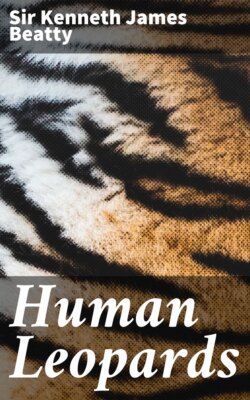Читать книгу Human Leopards - Sir Kenneth James Beatty - Страница 7
На сайте Литреса книга снята с продажи.
Tongo Players
ОглавлениеA quotation which Mr. Alldridge has been so good as to allow from his “Sherbro and its Hinterland” (pp. 156–159) with respect to the Tongo players already alluded to will illustrate the atmosphere in which the human leopards worked.
“Formerly when suspicious circumstances, such as frequent sudden deaths, or the continuous disappearance of individuals, as in the case of the victims of the Human Leopards, arose and baffled the local fetish, recourse was had to the terrible Tongo player system, especially if cannibalism was thought to be at the bottom of the mischief.
“To set this medicine going the intervention of a most appalling fetish had to be invoked through a class of medicine people from the upper country called the Tongo players.
“As soon as the Tongo players had determined to comply with a request from a chief, they sent out their emissaries into his towns and villages to obtain information concerning suspected people. When all was ready the head of the Tongo, named Buamor Neppor, attended by his two principal assistants, Akawa (Big Thing) and Bojuwa (Great Thing) with their following, arrived in the principal town and proceeded to clear a space in the bush for their encampment, where they made their fetish medicine. This place of concealment was called Mashundu.
“In the investigation one village at a time was dealt with. A messenger was despatched to call all the men, women, and children to a meeting to be held on an appointed day.
“The meeting was held on a cleared space, called the Korbangai, outside the town, to which the people had been summoned. They were then drawn up into line. Their names were called by a spy from their own village, who was in the pay of the Tongo players. Certain questions were asked. The names of suspected persons were then submitted to the medicine-men, hidden in the bush, who professed to go through the ordeal by which the guilt or innocence of these suspected persons might be determined. The operator’s ordeal was the plunging his hand into a cauldron of boiling oil and pulling out a piece of hot iron. If the hand was burned, it was certain proof of guilt; if not burned, of innocence.
“The victim thus being found out, he was brought before the head Tongo player, who asked him if he were prepared to pay money. If he were, time was allowed for him to send to his family; meanwhile he was detained and stocked. Having got as much as they could out of the man and his family, an excuse was made, and he was burned to death.
“On some occasions a Tongo play was held. The players were arrayed in barbaric costume. They wore a leopard-skin cap, the side flaps of which drooped over the face, a leopard tail hung down from the back of the cap, and a sort of door bell was attached to the end. There was a leopard-skin jacket; the wrists, elbows, and ankles were further adorned with strips of leopard skin; the whole costume being completed by short cloth knickers, trimmed with leopard skin, and leopard-skin gaiters.
“The Tongo players came out and danced; the headman and his attendant carried a knobbed staff set with sharp cutting instruments, called the Tongora, which was loosely veiled with leopard skin.
“While dancing the headman and his two attendants suddenly rushed up to the suspected persons and dealt them heavy blows with the Tongora, blows which may or may not have killed them at once; but whether killed or not they were quickly taken away and thrown on the fire.”
